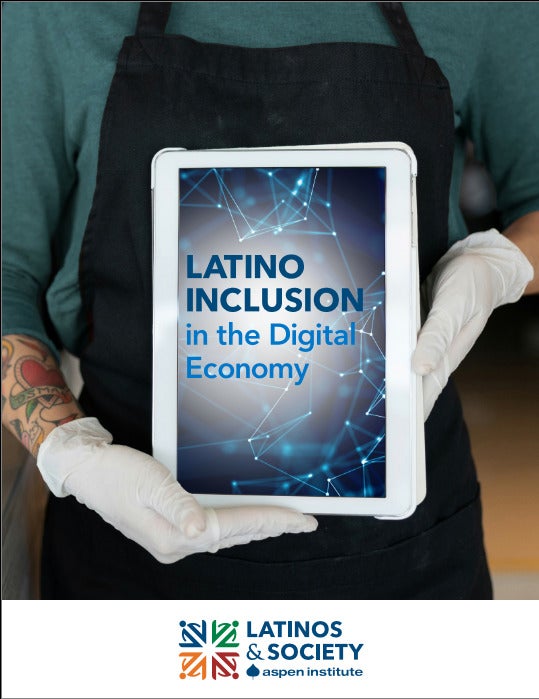The last couple of decades have seen a steady growth in Latinos’ participation in the US economy. Representing 17.5% of all US workers in 2018, Latino participation levels have almost doubled since 1998 (10.4%) and are projected to reach 20.9% by 2028. Similarly, Latino-owned businesses have also proliferated in the last decade, increasing by 34% between 2008 and 2018, compared to just 1% growth for all other small businesses. However, these important economic contributions mask a grim reality that has become more evident as businesses have increased their digital strategies during the COVID-19 pandemic: Latino workers and businesses are insufficiently tooled to successfully transition into the digital economy.
Even before the pandemic, a 2019 report by the McKinsey Global Institute found that Latinos have the highest potential rates of job displacement due to automation among racial and ethnic groups, estimated to be around 25.5% and affecting 7.4 million Latino workers. Additionally, Latino workers are still highly underrepresented in the tech and digital workforce, making up only 8% of Science, Technology, Engineering and Math (STEM) workers despite being 18.5% of the US population. While a 2020 report showed similar levels of interest in STEM courses and careers among Latino students and historically overrepresented groups (white and Asian), Latino students tend to complete fewer STEM courses, and have lower GPAs and lower STEM confidence. On top of that, Latinas, together with Black women, are the lowest-paid segment of the STEM workforce. Structural factors at the root of unequal educational attainment and wealth and income disparities across racial, ethnic, and gender categories, together with the legacy of policies that have historically limited opportunities by race, contribute to these striking differences.
The OECD Survey of Adults Skills (PIAAC) 2012-14 sheds some additional light on this issue. According to a report by the National Skills Coalition that draws on the survey, more than half of Latino workers aged 16-64 had no or limited digital skills, compared to one-third of all American workers, regardless of race or ethnicity. . As a result, the study suggests that Latino workers are in need of opportunities to develop or expand their digital skills.
The COVID-19 pandemic exposed the depth of the digital divide that affects the Latino community, including Latino children and teenagers’ educational outcomes. The 2020 “Latino Parent Voices: What Our Families Need Now” report indicates that 33% of Latino families reported not having regular access to the internet, and many only had access through their cell phones. Additionally, 53% of Latino parents reported not having enough computers, tablets, or laptops to support distance learning.
The recently launched Emergency Broadband Benefit (EBB) is a key step forward in addressing the insufficient connectivity and access to devices that affect Latino households. This program provides eligible households a discount of up to $50 per month to help pay for broadband internet services and a one-time $100 benefit toward the purchase of a computer or tablet device. The EBB Para Mí campaign, jointly developed by the Federal Communications Commission and the Hispanic Technology and Telecommunications Partnership, represents a good practice of culturally responsive policymaking.
As connectivity and device accessibility issues are addressed by the EBB, the digital skills divide remains a sizable challenge ahead. As discussed in a recently published report by Aspen Latinos & Society, a large share of the Latino workforce is concentrated in four sectors (retail, leisure and hospitality, agriculture, and construction) that have higher risks of job loss due to automation and digitalization. Thus, developing the digital skills of the Latino workforce has become more urgent than ever. Building needed digital skills will help ensure that Latino workers are not left behind in the digital economy and that they can fully benefit from technological innovation.
Against this backdrop, the Aspen Institute Latinos and Society Program and the Economic Opportunities Program have launched a new research project that aims to improve understanding of the obstacles and opportunities that Latinos face to better integrate them into the digital economy. Through the project, funded by Google.org, our programs are engaging with firms that employ Latinos across the retail, construction, hospitality, agriculture, and manufacturing sectors to identify the digital skills that these industries need in a changing economy. The project also aims to bring to light promising business practices and ecosystem approaches to developing the digital skills of the Latino workforce and, in turn, increase productivity and profitability that benefits both the local and national economy.
As the US sets off to build back better from the pandemic, this is a unique opportunity to identify and promote pathways toward digital inclusion for Latino workers, contributing to a robust and sustainable recovery of the American economy. As part of these efforts, it will also be crucial to shift the narrative around Latinos and tech, showcasing the many examples of Latino talent behind groundbreaking and impactful innovations, questioning unhelpful misconceptions among decision-makers and gatekeepers, and inspiring younger Latino generations all around the country.


